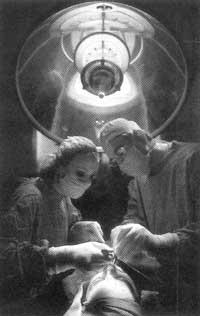Depression in autumn
1997/09/01 Agirre, Jabier - Medikua eta OEEko kidea Iturria: Elhuyar aldizkaria
Besides being a cyclic disease (which appears and disappears according to the time of year), XXI can be a depression. One of the most serious problems of the twentieth century. Thus, the World Health Organization has considered depression as the most frequent health problem of the year 2000.
Taking into account the above, mental health experts want to make an important effort to know in depth the depressive manifestations and to be able to fight against the causes that cause these signs.
The question can be really alarming. According to the Valencian Society of Psychiatry, 250 million people worldwide are depressed, of which 2.5 million are in Spain. According to the white book presented in May of this year in Bilbao by the Cabinet of Sociological Research, Bernad Krieft, on the quality of care of depression, 18% of the Basques will suffer a depression that forces them to come to the doctor throughout their lives. In other words, one in 5 patients who go through the primary care doctor's office has a depressive picture (a figure that gives us a clear idea of the magnitude of the disease in our society).
What is depression?

Despite the multiple depressions that exist, in general it can be said that it is a situation of discouragement or of deep fall, which can last some hours or even months, depending on the personal state of the patient, depending on the causes that motivate him. Throughout our life we spend more than once moments like this (we see everything dark, we have no mood for anything, etc.) And we remain as an incomprehensible sadness, which can close us inside and establish relations with the outside. Perhaps we immediately pass this situation and will return to normality, but eye, it can be a picture of depression. If similar situations are repeated for no apparent reason or persist longer than normal, there are reasons to worry and it may be convenient to go to the doctor.
What Causes Depression?
The reasons can be very different:
- It can occur in critical moments of life: crisis within the family, disappointment in the sentimental part or at the level of ideas, labor dissatisfaction, etc. But with them, physiological changes in our body also have their role. Therefore, depression is abundant in adolescence, pregnancy, menopause, or the elderly.
- It is also very typical the disorder that occurs in your body when the woman is “with the rule”. In this season drastic changes occur or in the mood. Researchers at the Edinburgh Brain Metabolism Unit have studied the reason for this situation and have come to the conclusion that estrogen, a hormone secreted by the brain itself, is one of the main responsible for these changes. During menstruation, women flow less estrogens, which would explain sudden changes in mood or malenconia or a state of sadness that is hardly justifiable. The same would happen with menopausal.
How does depression appear?
The depressed person cannot hide melancholy or sadness, even before unknown persons. Depression usually appears with most of the following symptoms:
- Constant desire to cry.
- The future looks pessimistic or pessimistic.
- Self-contempt.
- Total loss of interest in the activities that until now have been developed (and that, year after year and apparently, gave satisfaction).
- Permanent and unjustified fatigue.
- Lack of will for sexual relations.
- Irritability, ease to react with violence and hardness by any nonsense.
- Lack of appetite or, on the contrary, hunger for vertigo.
- Constipation or diarrhea.
- Menstrual alterations.
- Sleep disorders (can be insomnia or insomnia or insomnia, or continuous sleep).
Usually women are more bulbous in the face of depression, and to explain it, the importance of the social and family environment is highlighted, since women in general have less social relations than men. But women who have the opportunity to get out of their family environment (for example, those who work outside the home) do not get rid of the clutches of depression.
Currently, another age group is also taken into account when establishing the diagnosis of depression, which is surprisingly made up of children. Factors that can cause depression in childhood, such as the existence of a family history of mental illness or suicide, the loss of one of the parents, the separation of parents, the abandonment of children, etc.
As a sign of the growing importance of patients of this age, pharmaceutical multinationals are touching and studying the effects that the use of antidepressant drugs can cause on children. And as a curiosity, I would like to say that BRORAC, the world's best-selling antidepressant, will have, without a doubt, a delicious mint flavor so that you can like children.
How to face depression?
Although the disease is very frequent, and although its effect and incidence is increasing, there are still few who come to the doctor for this reason. However, specialists agree that it is very important to take the disease on time and not when it has given significant manifestations.
Although much progress has been made in the treatment of depression, as noted by Dr. Gutierrez, Head of the Psychiatric Service of the Hospital Santiago de Vitoria-Gasteiz in the presentation act of the White Book mentioned above, “we have not yet done more than begin to understand the functioning of the brain”, so we still do not fully know the factors causing this pathology.
The lack of coordination between primary care physicians (home or head physicians) and psychiatric specialists is another of the serious errors or gaps at this point, which makes it impossible or very difficult to treat the patient. Due to this remoteness or discoordination, many times the family doctor does not send their patients to the specialist, and they themselves will take care of the treatment control. And on that path we must see the criticisms made by Dr. Gutierrez, since many of the depressed patients are treated with anxiolytics (for example, with drugs such as TRANXILIM or ORFIDAL) by the physicians of the primary network, who often have a risk of physical dependence in patients who do not have anxiety.
In the treatment, therefore, it is essential to have a proper diagnosis since we must take into account other symptoms or situations that can accompany depression, such as anxiety. According to Dr. Gutierrez, only one in three average depressions is diagnosed, but half (50%) of them is recovered within six months or one year. The rest become chronic and are usually more difficult to heal.
Against depression
- If you have a lot of anxiety and also continuously (it can cause long-term depression), go. A study at the University of Massachusetts has shown that walking a half hour a day is very good to avoid anxiety.
- Having a nice time with your friends and family can be a good way to face that sadness you feel.
- Although it costs, always seeks to seek the positive part. The most banal things can also be a source of happiness and especially will help you forget misfortunes and sorrows.
- Always act on something. Look for activities and tasks that help you give your time in a pleasant way.
- Obligations should not cover all day. Let at least one hour a day be for you, for whatever you want, for whatever you like, to rest and relax.
- Enjoy the music, the kitchen…
- Think that depression is also healing and that the bad mood you have today with you will not be forever.

Gai honi buruzko eduki gehiago
Elhuyarrek garatutako teknologia






